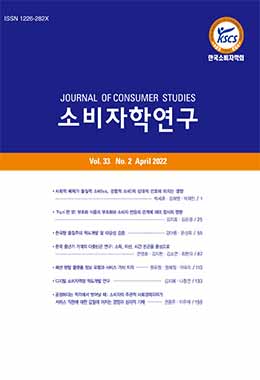본 연구에서는 소비자들의 주관적 사회경제지위가 서비스 직원들을 향한 갑질에 미치는 효과를 검증하고, 그 효과의 심리적 기제를 분석하였다. 연구1A에서는 서울시에서 조사를 진행하고 공개한 대규모 패널 데이터를 분석하여 주관적 사회경제지위가 높을수록 가난을 개인의 게으름보다는 사회제도에 책임이 있다고 귀인하는 경향이 높아지는 상관관계를 확인하였다. 또한, 가난에 대한 책임 귀인 경향을 종속변수로, 사회경제지위, 경제적 이동성에 대한 인식, 정치적 성향, 가구소득, 근로소득, 나이, 성별을 독립변수로 하는 다중 회귀분석을 통하여 다른 변수들을 통제한 경우에도 사회경제지위와 가난에 대한 책임 귀인 경향의 관계는 동일하게 유지되는 것을 확인했다. 연구1B에서는 온라인 설문조사를 통하여 모집한 영국 참여자들의 응답을 분석한 결과, 주관적 사회경제지위가 높을수록 자신보다 낮은 사회 계층에 속한 사람들에 대한 호감도가 증가하는 결과를 보였다. 그러나, 자신과 동등하거나, 자신보다 높은 사회 계층에 속한 사람들에 대한 호감도는 사회경제지위와의 관계가 유의하지 않았다. 이러한 결과는 각 계층에 대한 호감도를 종속변수로, 사회경제지위 및 연구1A와 동일한 통제변수들을 독립변수로 포함한 다중 회귀분석에서도 동일하게 나타났다. 이러한 결과를 바탕으로, 연구2에서는 영국 참여자들의 응답을 분석하여 소비자들의 주관적 사회경제지위와 서비스 직원을 향한 갑질의 관계 및 그 심리적 기제를 검증하였다. 그 결과, 소비자들의 주관적 사회경제지위가 높아질수록, 타인 대비 자신의 경제적 지위 상승의 용이성을 인식하게 되어 서비스 직원들을 향한 갑질이 감소하는 결과를 확인하였다. 또한, 사회경제지위가 상승할수록 관점수용이 증가함에 따라 소비자 갑질이 감소할 가능성에 대한 대안 설명을 제거하였다. 이러한 분석 결과를 바탕으로 이론적, 실무적 시사점과 본 연구의 한계점 및 향후 연구 방향을 제시했다.
The current study examined the effect of consumers’ subjective socioeconomic status on Gapjil toward service employees and proposed a psychological mechanism for the aforementioned effect. In Study 1A, we analyzed large-scale panel data which were collected and disclosed by Seoul Metropolitan Government. The results of correlational analyses revealed that the higher the socioeconomic status, the higher the tendency to attribute poverty to social institutions rather than individual laziness. The results of multiple regression analyses also revealed that the positive association between socioeconomic status and the attribution of poverty to social institution was maintained even when the effects of perceived economic mobility, political orientation, household income, personal income, age, and gender were controlled for. In Study 1B, we analyzed the responses of UK participants recruited through an online survey and found that people with higher (vs. lower) socioeconomic status had more favorable attitudes toward those in the lower social class than themselves. However, socioeconomic status did not have significant associations with attitudes toward people in the same or higher social class. These relationships between socioeconomic status and attitudes toward people in each social class were maintained when control variables were included in multiple regression analyses. Based on these results, in Study 2, we analyzed the responses of UK participants to verify the effect of socioeconomic status of consumers on Gapjil toward service employees and its psychological mechanism. We found that consumers with higher (vs. lower) socioeconomic status perceived greater ease of increasing status compared with others, thereby decreasing Gapjil toward service employees. We also ruled out an alternative account that socioeconomic status decreased Gapjil through enhancing perspective-taking. Based on these results, we discussed theoretical and practical implications, limitations of this research, and future research directions.


